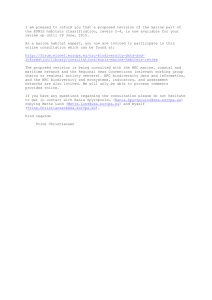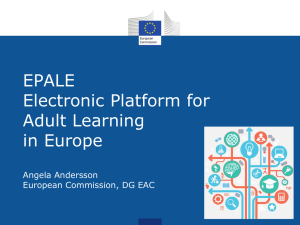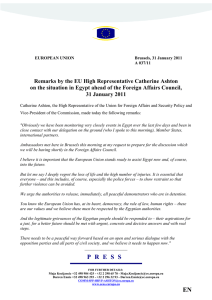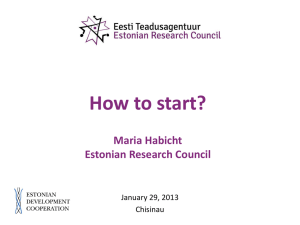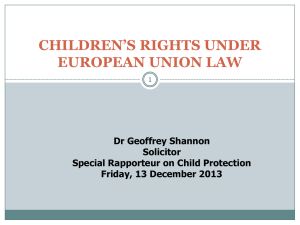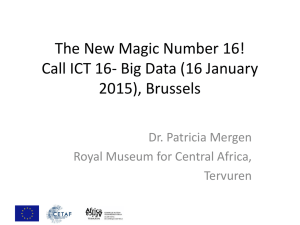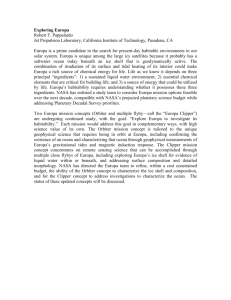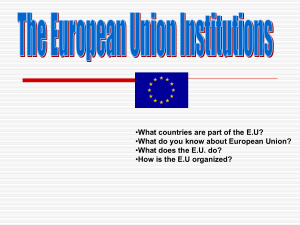Number 36 9th September 2011 EENW Information Bulletin The
advertisement
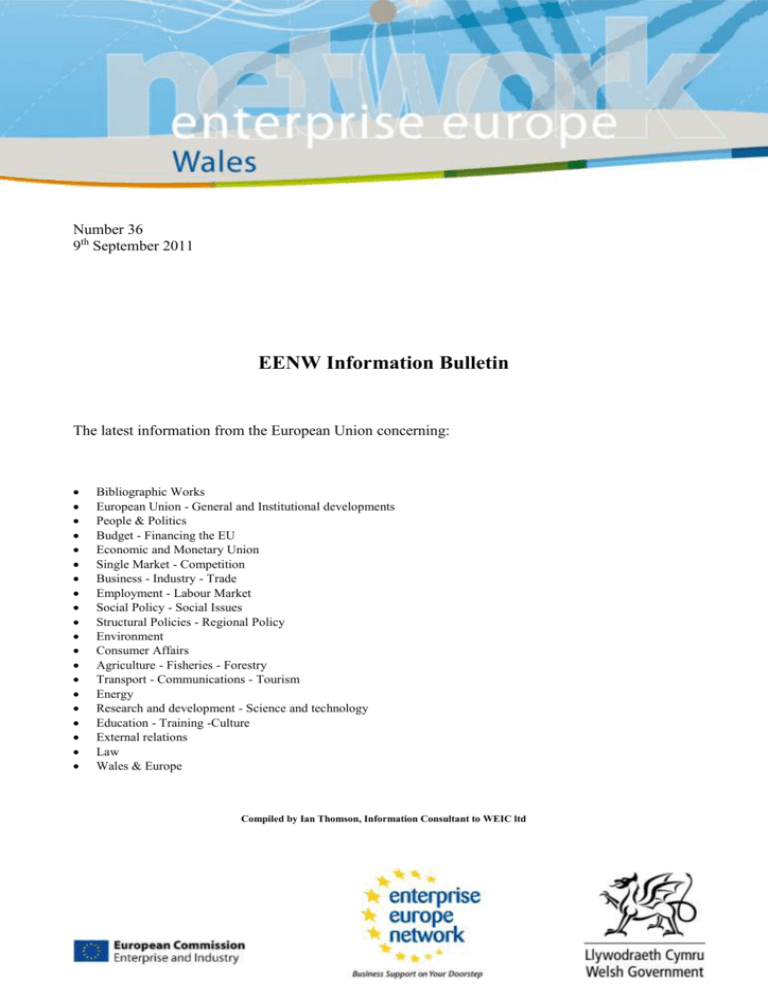
Number 36 9th September 2011 EENW Information Bulletin The latest information from the European Union concerning: Bibliographic Works European Union - General and Institutional developments People & Politics Budget - Financing the EU Economic and Monetary Union Single Market - Competition Business - Industry - Trade Employment - Labour Market Social Policy - Social Issues Structural Policies - Regional Policy Environment Consumer Affairs Agriculture - Fisheries - Forestry Transport - Communications - Tourism Energy Research and development - Science and technology Education - Training -Culture External relations Law Wales & Europe Compiled by Ian Thomson, Information Consultant to WEIC ltd Business - Industry - Trade Press Release: Digital Agenda: EU funded project aims to make self-service terminals more accessible for all An EU-funded project is aiming to make self-service terminals, such as public transport ticket vending machines or public information kiosks and cash dispensers, more accessible for the one in six Europeans who have a disability or the 87 million Europeans aged 65 and over. According to an EU study, only 38% of bank cash machines (automated teller machines or ATMs) across the EU provide voice capabilities to customers with disabilities, far behind the US (61%) and Canada (nearly all ATMs). The European Commission is contributing €3.41 million, half of the overall budget, to the "APSIS4All" project which aims to design and validate personalised interfaces, including contactless cards, to help overcome existing accessibility barriers. Trials will begin in cash dispensers in Barcelona, Spain from September 2011 and at ticket vending machines in Paderborn, Germany from January 2012, and will run for three years. Press Release IP/11/992 (30.8.11) (European Commission: DG Communication) http://europa.eu/rapid/pressReleasesAction.do?reference=IP/11/992&format=HTML&aged=0&language=EN&guiLanguage=en Access to finance: instrumental in SME success While small and medium-sized enterprises (SMEs) are crucial to Europe’s economic well-being, they often find it difficult to secure financing. To tackle this issue, the EU has developed tools specifically aimed at giving SMEs greater access to loans and equity finance: these financial instruments, funded under the Competitiveness and Innovation Framework Programme (CIP), have a strong track record of success. Enterprise & Industry Magazine No.11, September 2011 (European Commission: DG Enterprise) http://ec.europa.eu/enterprise/e_i/index_en.htm http://ec.europa.eu/enterprise/magazine/articles/smes-entrepreneurship/article_11009_en.htm Regulators poised to soften new bank rules Article reports that global bank regulators were preparing to ease new rules in September 2011 that would require banks to hold more liquid assets to withstand a funding crunch in a crisis. The move follows complaints from banks that the new Basel III standards on liquidity – the first international rules of their kind – would force them to sharply curtail lending to consumers and businesses. A JPMorgan analysis concluded that the new liquidity coverage ratio is the most 'painful' piece of regulation to hit the sector, and would cost European banks nearly 12% of their 2012 earnings on average. Financial Times 6.9.11 (Murphy, Megan, Masters, Brooke) http://www.ft.com/cms/s/0/ca79e2ec-d7cd-11e0-a5d9-00144feabdc0.html Lagarde calls for urgent action on banks Report of a speech by Christine Lagarde, Managing Director of the International Monetary Fund at the (US) Federal Reserve’s annual gathering of central bankers in Jackson Hole, Wyoming on the 27 August 2011. She said that European banks might need forced capital injections to stop the spread of the eurozone’s sovereign and financial crisis, in one of the starkest warnings from a senior policymaker about the danger of a new global slowdown. European officials rounded on Christine Lagarde following the speech, accusing her of making a 'confused' and 'misguided' attack on the health of Europe’s banks. Jean-Claude Trichet, President of the European Central Bank, and Olli Rehn, the European Commission’s economic chief – went before the European Parliament on the 29 August 2011 to insist that neither bank liquidity nor capitalisation were a danger. Separately, the European Banking Authority, a supervisory body for banks in the European Union, called for the €440bn European Financial Stability Facility (EFSF) to provide direct capital injections to ailing banks. The apparent rift between the EU and IMF in the assessement of the risk to banks and the measures needed to contain them could heighten market concerns about how the debt crisis is being handled. Financial Times 27.8.11 (Harding, Robin) Environment Press Release: Final assessment of the 6th Environment Action Programme shows progress in environment policy – but with shortfalls in implementation Over the past decade the 6th Community Environment Action Programme (EAP) has helped environment legislation to tackle almost all areas of the environment. This is evident from the final assessment of the 6th EAP (2002-2012) adopted on 31 August 2011. Major accomplishments in the field of environment during the past ten years have been the extension of the Natura 2000 network to cover almost 18% of the EU's land area, the introduction of a comprehensive chemicals policy, and policy action on climate change. However, there is progress to be made in implementing agreed EU objectives and rules and in improving biodiversity protection, soil and water quality. The decoupling of resource use from economic growth has not led to a decrease in overall resources use. Press Release IP/11/996 (31.8.11) (European Commission: DG Communication) http://europa.eu/rapid/pressReleasesAction.do?reference=IP/11/996&format=HTML&aged=0&language=EN&guiLanguage=en The Implementation of European Environmental Directives: Are Problems Caused by the Quality of the Directives? European Directives must be implemented in national legislation. Given the large amount of infringement procedures before the European Court of Justice, many mistakes are being made in this implementation process. Problems concerning the quality of Directives, such as a lack of coherence between Directives, unclear terms and definitions, questions concerning the scope of Directives et cetera, are not felt at the European level, but place the Member States in a difficult position when implementing the Directives. This article shows how these factors contribute to the occurrence of implementation problems in the field of environmental law. These problems cannot be solved by the Member States, but should be taken into account in the legislative process at the European level. European Energy and Environmental Law Review Vol.20, No.3, August 2011, p150-163 (Beijen, Barbara A) http://www.kluwerlawonline.com/index.php?area=Journals Press Release: Public consultation on 20 potential Substances of Very High Concern The European Chemicals Agency (ECHA), on 29 August 2011, published proposals to identify 20 chemicals as Substances of Very High Concern (SVHCs) and thus as possible candidates for authorisation. Interested parties are invited to comment on the proposals by 13 October 2011. Press Release ECHA/PR/11/20 (29.8.11) (European Chemicals Agency) http://echa.europa.eu/ http://echa.europa.eu/news/pr/201108/pr_11_20_svhc_consultation_20110829_en.asp Landscape fragmentation in Europe The joint report from the European Environment Agency (EEA) and the Swiss Federal Office for the Environment demonstrates how areas of land are often unable to support high levels of biodiversity when they are split into smaller and smaller parcels. EEA Report No.2, 2011 (Swiss Federal Office for the Environment, European Environment Agency) http://www.eea.europa.eu/ http://www.eea.europa.eu/publications/landscape-fragmentation-in-europe Comparing European Instruments for Marine Nature Conservation: The OSPAR Convention, the Bern Convention, the Birds and Habitats Directives, and the Added Value of the Marine Strategy Framework Directive This article performs a comparative analysis of five major legal instruments for (marine) nature conservation in Europe, namely the 1979 Bern Convention on the Conservation of European Wildlife and Natural Habitats, the 1979 EU Wild Birds Directive, the 1992 EU Habitats Directive, the 1992 OSPAR Convention for the Protection of the Marine Environment of the North-East Atlantic, and the 2008 EU Marine Strategy Framework Directive (MSFD). Through this analysis, an answer is provided to the question what the recently added MSFD contributes to the pre-existing legal framework in the field of marine nature conservation. To provide the necessary focus, the analysis is carried out from the perspective of one marine subregion, the North Sea, although many elements of it are ostensibly of wider relevance. The article systematically explores the potential added value of the MSFD with regard to marine protected areas (MPAs) and other types of nature conservation measures. It concludes that the MSFD apparently contributes both substance and legal teeth to the legal framework for the protection, management and restoration of marine species, habitats and ecosystems in Europe. European Energy and Environmental Law Review Vol.20, No.3, August 2011, p129-149 (Trouwborst, Arie, Dotinga, Harm M) http://www.kluwerlawonline.com/index.php?area=Journals Waste opportunities: Past and future climate benefits from better municipal waste management in Europe There is huge potential for cutting greenhouse gases (GHGs) from municipal solid waste management, according to this report from the European Environment Agency (EEA). Using a lifecycle perspective, the report analyses the greenhouse gas emissions (GHG) from municipal solid waste management in the EU (excluding Cyprus), plus Norway and Switzerland. Three scenarios illustrate how waste management and associated GHG emissions might develop until 2020. EEA Report No.3, 2011 (European Environment Agency) http://www.eea.europa.eu/ http://www.eea.europa.eu/publications/waste-opportunities-84-past-and European Union Emissions Trading Scheme: Phase III The paper would attempt to present a prospective analysis of what are the challenges and prospects of the European Union Emissions Trading Scheme in Phase III (2013-2020) both for lawyers as well as industries. It will start with a brief introductory overview of the theoretical basis and fundamental developments in the EU ETS in general and would then continue with a focus on the future issues as, for example, possible expansion to include new industries and jurisdictions in the EU ETS, common emissions cap set at EU level in Phase III and other developments directly derived from Phase III. European Energy and Environmental Law Review Vol.20, No.3, August 2011, p164-173 (Okinczyc, Sebastian ) http://www.kluwerlawonline.com/index.php?area=Journals Press Release: Europol warns of increase in illegal waste dumping As part of its responsibility to monitor developments in the threat from organised crime in Europe, Europol has identified an increase in the volume of illegal waste shipments across borders, spurred by economic growth and globalisation. In the EU, the illegal trafficking of waste is particularly rising between countries in North West and North East Europe. Press Release 30.8.11 (Europol) https://www.europol.europa.eu/ https://www.europol.europa.eu/content/press/europol-warns-increase-illegal-waste-dumping-1053 Consumer Affairs Press Release: Electronic identification of bovines to further strengthen food safety and animal health in the EU The European Commission has adopted a proposal that will, when implemented, further enhance food safety and better safeguard animal health in the EU. In particular, the Commission proposal provides the legal framework for the introduction, for the first time and on a voluntary basis, of an electronic identification system (EID) for bovine animals. Press Release IP/11/991 (30.8.11) (European Commission: DG Communication) http://europa.eu/rapid/pressReleasesAction.do?reference=IP/11/991&format=HTML&aged=0&language=EN&guiLanguage=en Agriculture - Fisheries - Forestry The Welfare of Laying Hens Directive: Implications for the egg industry. Vol 1: Report, together with formal minutes, oral and written evidence. Vol 2: Additional written evidence The Welfare of Laying Hens Directive (Council Directive 1999/74/EC), which applies to businesses with over 350 laying hens, provides that conventional cage systems must not be used after 1 January 2012. UK egg producers have spent around £400 million to improve conditions for laying hens and, according to this report, will be left at a competitive disadvantage if cheaper, illegal and non-compliant shell eggs and egg products can be imported to the UK from other European countries. 9th Report (2010-12)HC 830 (United Kingdom: House of Commons: Environment, Food and Rural Affairs Committee) http://www.parliament.uk/ http://www.publications.parliament.uk/pa/cm201012/cmselect/cmenvfru/830/83002.htm The European response to BSE: A success story EFSA Journal 2011; 9(9):e991 (Editorial) (European Food Safety Authority) http://www.efsa.europa.eu/ http://www.efsa.europa.eu/en/efsajournal/pub/e991.htm Energy The European Offshore Supergrid and the Expansion of Offshore Wind Energy in Germany, Ireland and the United Kingdom – Legal, Political and Practical Challenge European Energy and Environmental Law Review Vol.20, No.3, August 2011, p120-128 (Tscherning, Rüdiger) http://www.kluwerlawonline.com/index.php?area=Journals Research and development - Science and technology Shaping a new EU space policy While some may consider space to be a luxury that Europe cannot afford during a time of austerity, nothing could be further from the truth. Improving the safety and daily lives of European citizens thanks to radio navigation, guiding tractors by satellite for high-yield crops, optimising responses to humanitarian crisis. This is not science fiction but just a few examples of innovations related to space technologies developed today. Many thousands of highly skilled jobs rely on the sector, which is working to make people’s lives easier and safer, and European industry as a whole more competitive. To ensure continued success, the European Commission is developing an integrated space policy that will strengthen Europe’s space infrastructure. Enterprise & Industry Magazine No.11, September 2011 (European Commission: DG Enterprise) http://ec.europa.eu/enterprise/e_i/index_en.htm http://ec.europa.eu/enterprise/magazine/articles/industrial-policy/article_11000_en.htm External Relations Website: The EU Twinning Programme Provides background information on the EU Twinning Programme, provides examples of recent UK twinning projects and information on current twinning fiches. (United Kingdom: Foreign and Commonwealth Office) http://www.fco.gov.uk/ http://www.fco.gov.uk/en/global-issues/european-union/eu-twinning-taiex-programmes/eu-uk-twinning-programme/ Green Paper - The dual-use export control system of the European Union: ensuring security and competitiveness in a changing world Controlling the export of dual-use items, that is items which can be used for both civil and military purposes, is at the forefront of international non-proliferation efforts. Guided by security objectives, dual-use export controls are implemented through trade measures taking the form of authorisation requirements for the export of dual-use items to third countries. The high-tech nature of such goods and technologies, and the considerable volume of trade in them, means that the dual-use sector is a crucial element of the EU's drive towards innovation and competitiveness. Consequently, when controlling exports, particular attention needs to be paid to striking the right balance between the pursued security objective and the need to support business activities. This close link between security and trade is at the heart of dual-use export controls. It is also what creates particular challenges for implementation within the European Union. COM (2011) 393 final (30.6.11) (European Commission) http://eur-lex.europa.eu/COMIndex.do?ihmlang=en http://eur-lex.europa.eu/LexUriServ/LexUriServ.do?uri=COM:2011:0393:FIN:EN:PDF
